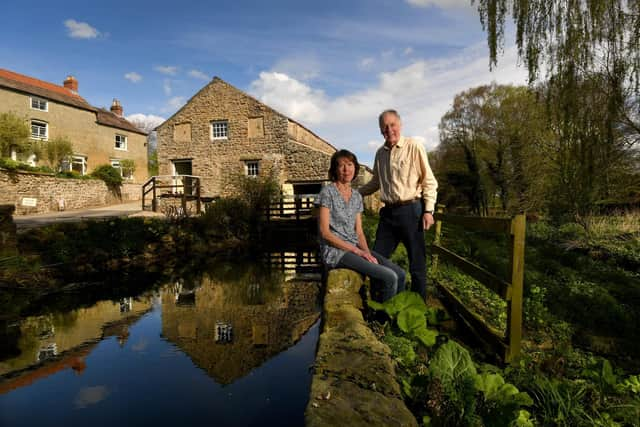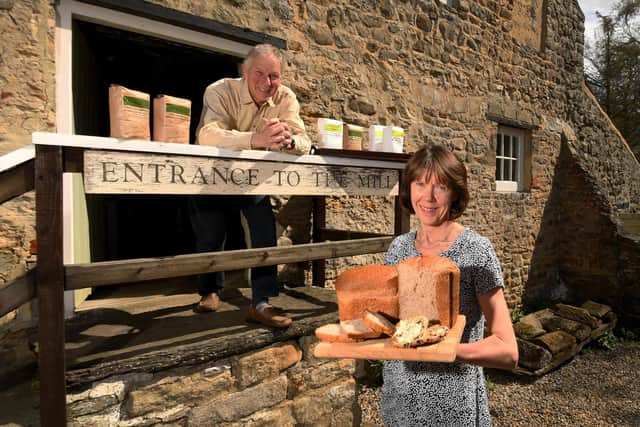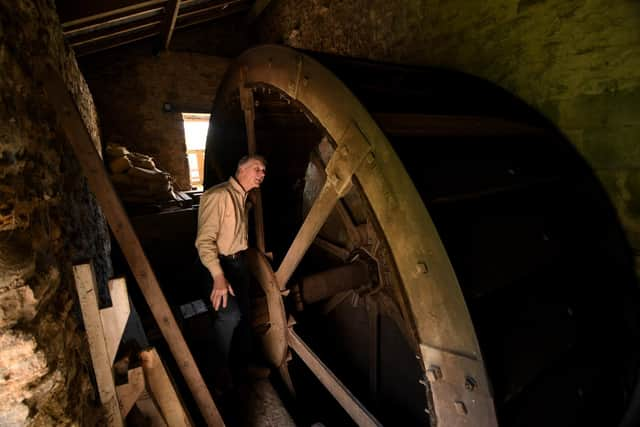Crakehall Watermill: Meet the accidental miller who began producing his own flour after buying a B&B
Twelve years ago, a North Yorkshire watermill in Wensleydale was restored and now produces wholemeal and spelt flour and next month will see its owner proudly running tours on National Mills Weekend.
Lionel Green and his wife Alison Barnes took on the then-disused watermill in 2004 when they purchased a property to set up a bed and breakfast establishment. Lionel said his introduction to being a mill owner came with their purchase.
Advertisement
Hide AdAdvertisement
Hide Ad“We were told ‘by the way, you get a mill with the property’. I didn’t know anything about milling and I’m still on a steep learning curve even though it has now been functional again since 2010.


“It had been brought back to life in 1980 by a previous owner fifty years after it had ceased milling in 1930 and had then become dormant once again in 2002 for two years as the short-term owners hadn’t seen milling as being for them.
“For us coming to Crakehall had been about establishing a location for a bed and breakfast business, but the mill is fascinating, interesting, historic and part of our heritage and I was prepared to engage with all of that.
“It really is special and with the increasing demand for sourdough bread our spelt and wholemeal flour is in demand.
Advertisement
Hide AdAdvertisement
Hide Ad“Watermills were once so important. They were a food production source and a latter day food factory. Now, we in our small way, are keeping that alive for new generations and to make the kind of bread people want.”


Impassioned by their purchase of the mill, Lionel said he made it his goal to get Crakehall Mill back operational and set about making contact with specialists in the milling world.
“I contacted the mills section of the Society for Protection of Ancient Buildings (SPAB) and it was through them I was able to find a millwright who advised us on what we needed to do to get it going again, which included fixing the water wheel and the setting up of the stones and gears so that everything was aligned correctly.
“The water wheel is made up of timber and iron shrouding and was in reasonably good condition considering it dates back to the 17th century, but it needed the stripping out of the old boards and re-timbering of the wheel.
Advertisement
Hide AdAdvertisement
Hide Ad

“A team of millwrights came in to check all of the mill’s workings and to set it up so that we could get started.
“Some of the timbers were good and sound enough to take the weight of one of the pairs of stones and our millwright suggested we concentrate on that one pair because the timber work under the other pair wasn’t so good.
“The stones are made of French Burr which was introduced in this country as the perfect stone for very good, high-quality milling in the 18th century as it makes a finer flour.
“For some years now we have been working with this one pair of stones to produce Crakehall’s Finest.”
Advertisement
Hide AdAdvertisement
Hide AdSuch has been Lionel’s development of Crakehall’s Finest, which is now sold in several of North Yorkshire’s top independent stores and farm shops and used by local bakers, that he said he is now embarking on a project to reinstate the second pair.
“You have to be passionate to take on milling, but flour produced across a network of watermills and windmills has become more popular across the country in more recent times and spelt wheat is very good for breadmaking of all kinds, particularly sourdough that everybody seems to enjoy making and eating.”
Lionel said he is always on the lookout for grain from his local area and previously had a farmer supply him from just a few miles away, but that at present his closest supplier is in County Durham and he has another in Norfolk.
“Years ago each mill would have been supplied by local farmers but such as spelt and group 1 wheat that we need isn’t always readily available close by and we only need small quantities, which isn’t what many farmers want to supply.
Advertisement
Hide AdAdvertisement
Hide Ad“I’m always happy to talk with others who might want to produce what we are looking for.
“We only produce wholemeal flour and spelt flour as we don’t have the facilities to make white flour. Spelt is an ancient subspecies of wheat but has more protein than wheat and is becoming better known because of this. We now have a following for our spelt flour.”
The green energy that runs Crakehall Watermill is Crakehall Beck, which Alison said is also known as Bedale Beck.
“It’s known as Crakehall Beck if you’re from Crakehall and in this part of Lower Wensleydale there were three working mills.
Advertisement
Hide AdAdvertisement
Hide Ad“Upstream was High Mill. This was Low Mill and half a mile further along was Kirkbridge Mill.
“We are not quite all-year round production as there are times when there are quite low levels of water supply that limits our production. We receive notices from the Environment Agency to let us know when levels are low.
“We have a weir from the river with a sluice gate to release water into a collecting pond reservoir about 100 metres long that offers the flow to the wheel.
“It then goes back out through the wheelhouse and back to the river another 100 metres along.”
Advertisement
Hide AdAdvertisement
Hide AdAlison said that their production is still small scale overall.
“We normally produce around two-and-a-half to three tonnes of flour per year, but during the pandemic the demand for locally produced flour saw us milling five tonnes of flour in 2020 when everyone went back to breadmaking at home.
Lionel said he’s looking forward to National Mills Weekend. “Everyone is so interested in the history and of our Crakehall’s Finest. It’s being held on May 7-8.”
